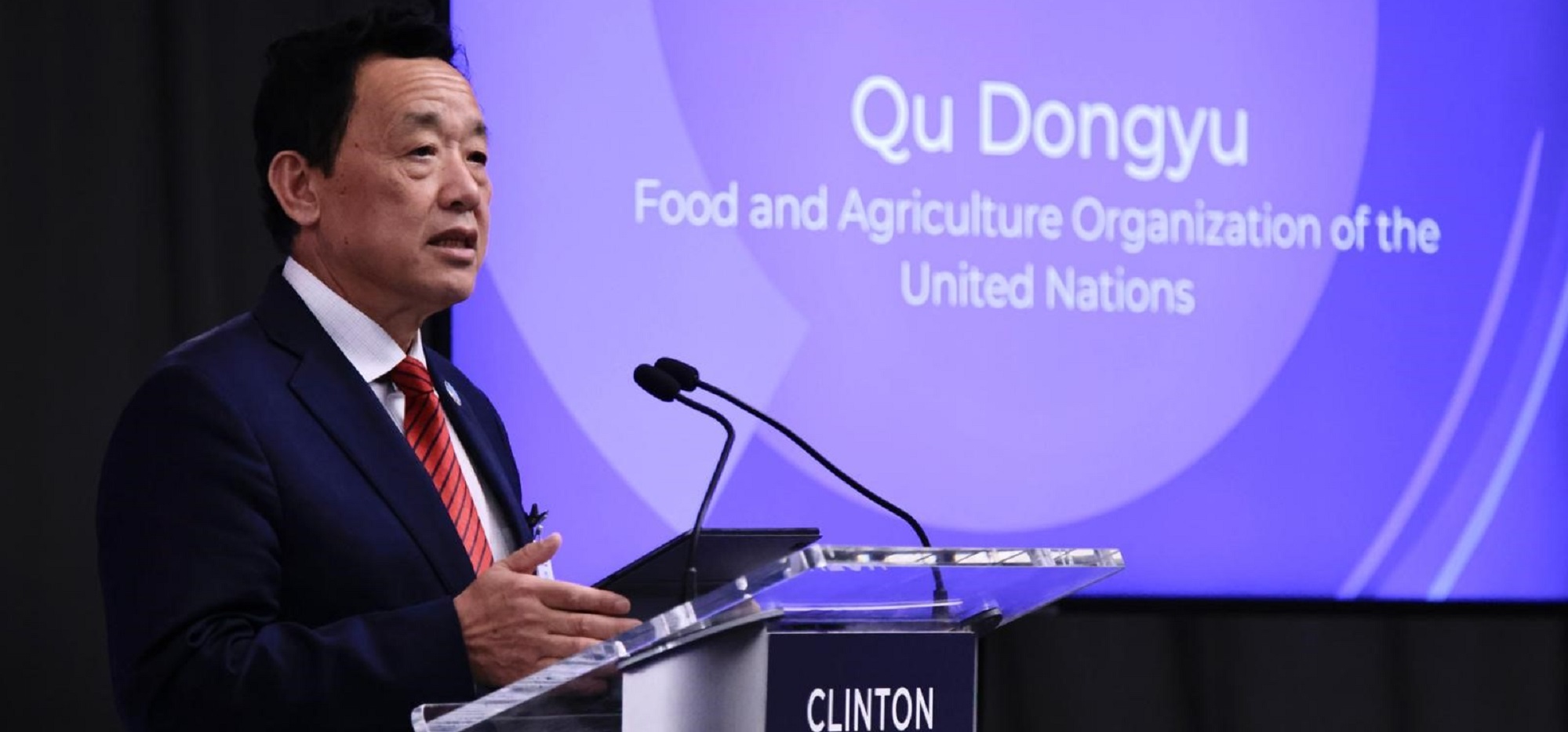FAO calls for solidarity and passion for humanity to combat rising hunger and poverty
Director-General QU Dongyu addresses high-level event organized by the Clinton Global Initiative in New York

FAO Director-General QU Dongyu.
©FAO/Kena Betancur
New York – It is time to “show solidarity and passion for humanity” to combat rising hunger and poverty due to a slew of causes that require a globally coordinated response, QU Dongyu, Director-General of the Food and Agriculture Organization of the United Nations (FAO), said today in opening remarks of a high-level event organized by the Clinton Global Initiative (CGI) on the sidelines of the 77th session of the UN General Assembly.
“We are at risk of facing a food access crisis right now, and a food availability and affordability crisis in the coming months,” he told an audience of around 100 business executives, leading philanthropists, heads of states and local grassroots community leaders who form part of the CGI community and were invited to discuss the “business of how” to assure sustainable access for all to nutritious food.
The Director-General applauded former President Bill Clinton for his leadership and the invitation to “re-think, re-envision the future of our world.” The event was called “The Food Crisis and the Threat of Global Destabilization: How We Can Take Urgent and Sustainable Action too Address Food Insecurity” and included a panel with President Lazarus McCarthy Chakwera of Malawi and other agrifood system actors.
Hunger levels are unacceptably high and have risen dramatically in the past two years, driven by conflict and destabilization, including the war in Ukraine, global and national economic shocks and a climate crisis that is “affecting every corner of this small planet,” Qu said.
“Our agrifood systems are fragile, and our supply chains are under pressure,” he added. “The magnitude and severity of acute food insecurity is daunting.”
Despite the challenges and difficulties, the Director-General declared himself “optimistic about the contributions that we can make to accelerate change.”
“Our focus is on transforming agrifood systems to be more efficient, more inclusive, more resilient and more sustainable, for better production, better nutrition, a better environment and a better life for all, leaving no one behind,” he said.
The road ahead
Qu pointed to key areas requiring commitments to action.
First, the climate crisis, whose impact has been borne mostly by the agriculture sector. Investing in agriculture and rural livelihoods is seven to 10 times more cost effective and sustainable than direct food assistance. This is why FAO is focused on investing in databased solutions in resilience to help farmers to anticipate and prepare for disasters. Still, only eight percent of all global food security funding in emergencies goes to assist agricultural production, he noted.
A by-product of natural disasters and the climate crisis is involuntary displacement, increasing the urgency for long-term viable solutions allowing the most vulnerable to have hope, opportunities, tools, resources and access to markets to build resilient livelihoods and achieve self-sufficiency, the Director-General said.
Second, there is a critical link between dietary quality and food security, making health equity from a food perspective a key lever for action. Today more than three billion people in the world, many in developed countries, cannot afford a healthy diet, underscoring the need for the global trade system to be kept open and for governments to allocate public budgets in a more efficient way.
“We need to expand the supply of nutritious foods, and then shift consumption towards them,” the Director-General said.
Third, inclusive economic recovery and growth is essential, as COVID-19 pandemic and conflicts have increased global income inequality and pummelled gender equality, decent employment and environmental ambitions, Qu noted.
Every one percent increase in the FAO Food Price Index, which hit record high numbers in 2022, could push 10 million more people into extreme poverty, which makes social protection programmes a priority arena for governments and key partners. “We need to implement policies that address structural inequalities and that target rural poverty,” he said, adding that solutions to address this global crisis will require proper policies, more investment and functional partnerships with the private sector.
Contact
Christopher Emsden FAO News and Media (Rome) (+39) 06 570 53291 [email protected]
FAO News and Media (+39) 06 570 53625 [email protected]
